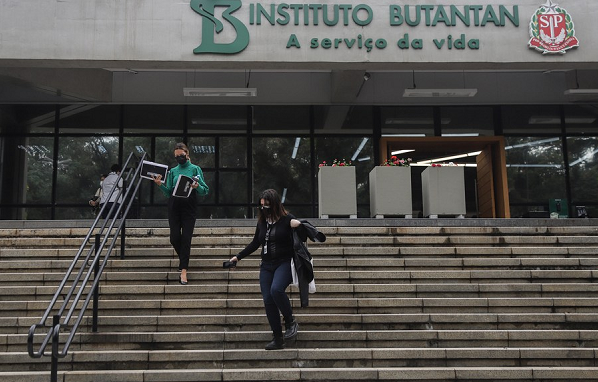Interview: Chinese vaccines effective in preventing COVID-19 deaths, severe cases

Photo taken on May 31, 2021 shows the Butantan Institute building in Sao Paulo, Brazil. (Photo by Rahel Patrasso/Xinhua)
Since June 2020, the Butantan Institute and China's biopharmaceutical company Sinovac Biotech have carried out a number of clinical studies, the most important of which is the Phase III clinical trial of the vaccine that has involved more than 10,000 volunteers. Covas said Sinovac's CoronaVac vaccine demonstrated its "excellent performance" in preventing deaths and severe cases.
"Chinese COVID-19 vaccines have performed very well in preventing deaths and severe cases, and reducing hospitalization rates," Dimas Covas, president of Brazil's Butantan Institute, has said.
"During the pandemic, what we want is the actual effect of the vaccines in preventing the serious harm of the virus," Covas told Xinhua in a recent interview.
A new standard for evaluating a vaccine during the pandemic should be created to replace the existing efficacy criterion that overemphasizes the prevention of infection rates, said Covas, who has personally experienced Brazil's fight against the COVID-19 pandemic, and witnessed the performance and efficacy of various vaccines.
This conclusion, he said, is based on a series of studies conducted by the Butantan Institute for more than a year. With a history of 120 years, the Butantan Institute is one of the most prestigious scientific centers in Brazil.
As some Western media overemphasize the prevention of infection rates while evaluating COVID-19 vaccines and underestimate their function in preventing death and severe illness, Covas said that the existing rules based on the prevention of infection as the main evaluation criterion are more suitable for evaluating vaccines developed during an epidemic rather than a pandemic.
"In the fight against COVID-19, we got vaccines for the first time during the pandemic," said Covas.
"The performance of China's Sinovac COVID-19 vaccine is 'excellent' because it has significantly reduced the number of hospitalizations, especially among the elderly and healthcare professionals, which shows that it is an excellent vaccine," he said.
Since June 2020, the Butantan Institute and China's biopharmaceutical company Sinovac Biotech have carried out a number of clinical studies, the most important of which is the Phase III clinical trial of the vaccine that has involved more than 10,000 volunteers. Covas said Sinovac's CoronaVac vaccine demonstrated its "excellent performance" in preventing deaths and severe cases.
Another important vaccine study was conducted in Serrana, a small city in Brazil's Sao Paulo state. The results announced at the end of May this year showed that compared with data at the beginning of the trial, the number of new symptomatic COVID-19 cases in the city dropped by 80 percent after the completion of full vaccination, hospitalizations were down by 86 percent, and COVID-induced deaths plunged by 95 percent.
"The effect is not only reflected in the population vaccinated, but also in the total population of the city. The results of this study show that once the adult population is vaccinated, the unvaccinated people will also benefit, such as children and adolescents in Serrana," said Covas.
Safety is another important evaluation criterion. In fact, the side effects of vaccines are one of the core concerns of those getting inoculated. In this regard, "among all the vaccines used in Brazil, Sinovac's CoronaVac vaccine is the safest," said Covas.
Availability of vaccines cannot be ignored while evaluating performance and effect of vaccines during a pandemic. Covas said the Butantan Institute and Sinovac brought the CoronaVac vaccine to Brazil in early 2021.
"In the early days of the fight against the COVID-19 pandemic, China's vaccines played an important role, especially for the most vulnerable people, such as the elderly over 60 and medical staff," said Covas.


